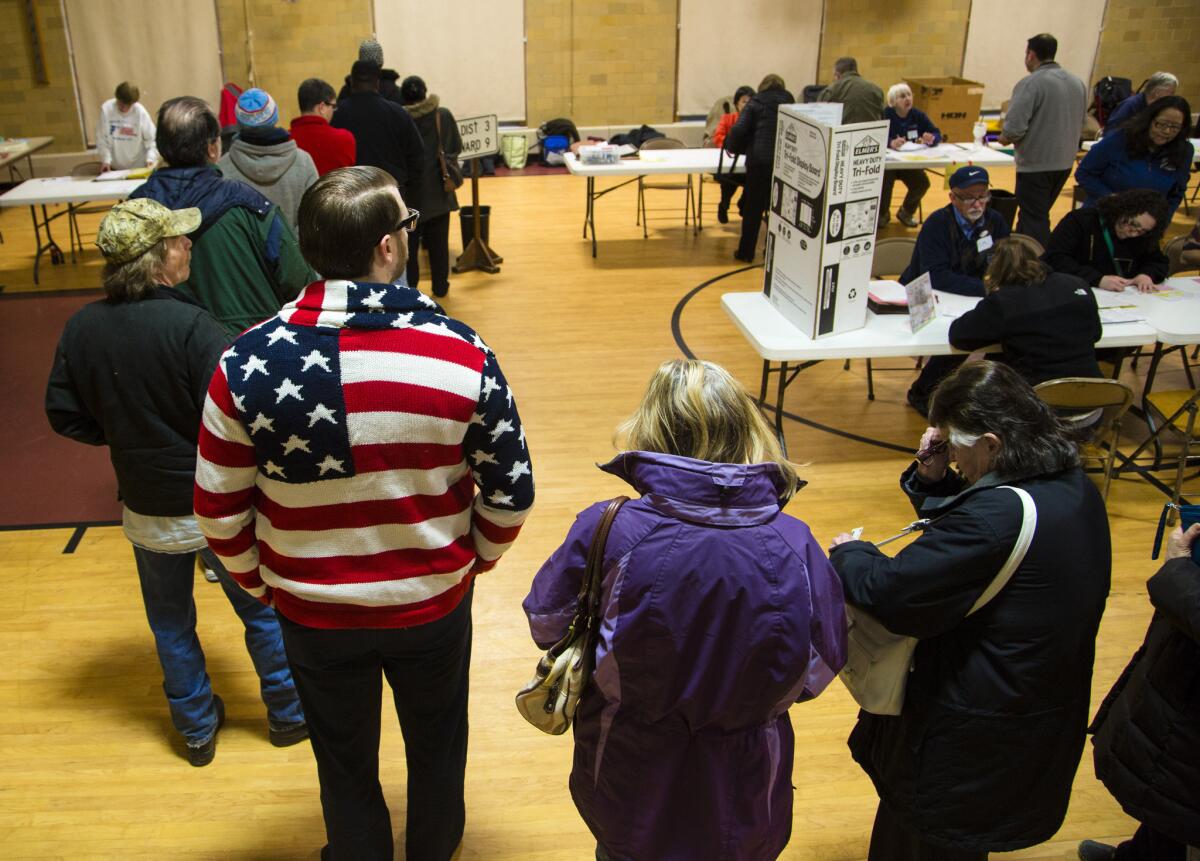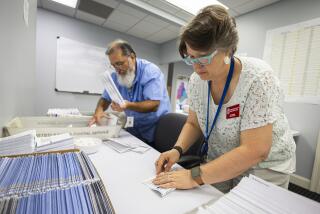Op-Ed: How Republicans are using the pandemic to suppress the vote

- Share via
Update, Apr. 6: On Monday, Wisconsin Gov. Tony Evers issued an executive order postponing in-person voting in the state’s presidential primary until June 9. Later in the day, the Wisconsin Supreme Court blocked the order.
Even in a pandemic, some Republicans are looking to suppress the vote for partisan political advantage. But the biggest power plays may come in November, and they could threaten our democracy.
With most of the country under a stay-at-home order, in-person voting right now is perilous. We don’t know what the situation will be like in November, but vote-by-mail is one way to help ensure that millions of Americans will be able to vote safely. Yet, across the country, some Republican legislators and leaders are opposing efforts to make voting safe and widespread.
In Wisconsin, Republican legislators have refused to postpone Tuesday’s scheduled primary despite the serious health risk posed by in-person voting. Some have suggested Wisconsin Republicans are happy to have depressed turnout to help a Republican-backed state Supreme Court candidate win election. On Friday, Gov. Tony Evers, a Democrat, called the Legislature into special session on Saturday to consider an election delay and shift to a mostly vote-by-mail election. But the Republicans immediately rejected any change to the election.
In Georgia, Republican state House Speaker David Ralston has opposed sending absentee ballots to every Georgia voter for the upcoming primary, claiming that such a change “will be extremely devastating to Republicans and conservatives in Georgia. Every registered voter is going to get one of these. … This will certainly drive up turnout.”
In North Carolina, Republican state Senate leader Phil Berger has opposed modest steps proposed by the state’s election director to make mail-in balloting easier during the pandemic, claiming the proposal is one backed by “progressive, liberal Democratic groups” to make absentee ballot tampering easier. Never mind that an earlier instance of vote tampering he pointed to involved helping a Republican congressional candidate.
And President Trump said on Monday that the congressional Democrats’ proposal in the $2-trillion coronavirus rescue bill to expand absentee voting nationwide would hurt Republicans. “They had levels of voting, that if you ever agreed to it, you’d never have a Republican elected in this country again.” That bill was passed with only $400 million allocated for coronavirus-related election-related expenses in the states, far less than the $2 billion needed in November.
Trump and Republican legislative leaders in Georgia, North Carolina and Wisconsin have made it clear that they fear increased voter turnout or that vote-by-mail will reduce Republican electoral chances.
Yet, there is no solid evidence that mail-in balloting would hurt Republicans in November. Utah, for example, is one of five states that conducts almost all of its voting in this way and still manages to elect plenty of Republicans. In fact, Republicans have traditionally done better in absentee balloting than Democrats, although in recent years, Democrats have surpassed them in some places. We don’t know how the pandemic will affect turnout. As of Friday morning in Wisconsin, for example, only 38% of voters who had requested an absentee ballot in heavily Democratic Milwaukee County had returned one, compared with over 56% of absentee voters in nearby Republican-leaning Waukesha County.
More importantly, trying to suppress the vote is morally wrong. Every eligible voter should have a chance to cast a ballot that will be accurately counted. This is all the more important since our elected leaders are making life-and-death decisions related to the coronavirus and voters must have a say about who should be entrusted to make those decisions.
I worry that some Republican leaders, given their recent track records, will try to manipulate election results in November. I see two main paths for chicanery.
First, Trump or state governors could seek to use public health concerns as a pretext to close polling places in Democratic cities in swing states. Voting would still take place, but turnout could be skewed to help Republicans.
More ominously, as Mark Joseph Stern has pointed out, state legislatures have the power under the Constitution to choose presidential electors. In its infamous 2000 decision in Bush vs. Gore, the U.S. Supreme Court remarked that although every state legislature had given voters the power to vote directly for the president and to allocate the state’s electoral college votes, state legislators could take back that power at any time.
What’s to stop Trump from appealing to Republican-controlled legislatures in the swing states of Arizona, Michigan, North Carolina, Pennsylvania and Wisconsin to take back this power from voters under the pretext that the risk of COVID-19 makes voting too difficult? Although all these states, except Arizona, have Democratic governors, some believe that the legislatures could take back this power even without the agreement of the governor.
Such a move would cause great social unrest, as voters see their power to choose the president taken away from them. It would be a power grab well beyond even the actions taken by some of these state legislatures to weaken the authority of newly-elected Democratic governors. But given the statements and actions of some Republican leaders in response to the coronavirus pandemic, it is no longer unthinkable.
Richard L. Hasen is a professor at UC Irvine School of Law and author of “Election Meltdown: Dirty Tricks, Distrust, and the Threat to American Democracy.”
More to Read
A cure for the common opinion
Get thought-provoking perspectives with our weekly newsletter.
You may occasionally receive promotional content from the Los Angeles Times.










